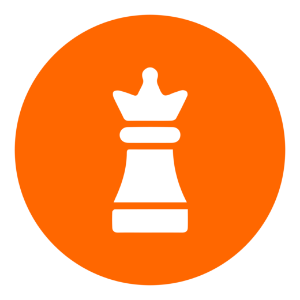Growth Is A Marathon.
Our Platform Makes The Difference.
The best performers are always learning and improving. Our platform gives a portfolio company the tools and training to develop product innovations that win customers in the market and create equity value faster with less risk.
A Customer-Focused Innovation Platform
Our innovation platform includes Jobs-to-be-Done training for a portfolio company's product, marketing, and sales teams. Each portfolio company's team learns our proprietary JTBD product innovation method on our platform and with our software.
1 Platform with 16 Lessons: Create Equity Value Faster
-
Section 1
Know Your Customer
-
Section 2
Create a Winning Strategy
Lesson 1: Intro to JTBD
Experience Accelerated Growth
The first lesson on our platform demonstrates our entire JTBD process from start to finish. It explains what a customer job is, how we structure and identify customer needs, and how we prioritize unmet needs. Each portfolio company team learns the power of JTBD to beat competitors, accelerate growth, and create equity value.

Lesson 2: Customers
How To Identify The Best Customers For Growth
Who is the customer a portfolio company should target for growth? In this lesson, the portfolio company's team learns how to distinguish between job beneficiaries, job executors, and purchase decisions makers. This helps avoid targeting the wrong customer for value creation, and helps the portfolio company identify the optimal unmet customer needs to target in the market.
Review Questions
- What defines a customer?
- Who is the key customer in the market?
Exercises
- Define the job beneficiary in the market
- Define the job executor in the market
- Define the purchaser in the market

Lesson 3: Markets
How to Avoid Lethal Market Mistakes
What is a market? Traditional definitions use products to define markets. This is a lethal mistake. Products, solutions, and technologies change over time, but a customer’s Job-to-be-Done does not. In this lesson, a portfolio company's team learns how to define a customer’s JTBD to ensure a valid, accurate, and stable market definition to target for growth and equity value creation.
Review Questions
- What is a customer job-to-be-done?
- What is a market?
- What are the three elements of a job-to-be-done?
Exercises
- Use the three elements of a job-to-be-done to define a target market

Lesson 4: Market Sizing
How To Identify The Biggest Market Growth Opportunity
How big is a portfolio company's market opportunity? Traditional market sizing equations all use the product price times the number of buyers to calculate size. But customers are not buying a product, they are hiring it to get a job done. In this lesson, a portfolio company's team learns to use the customer’s willingness to pay to get their job done to identify larger, hidden opportunities to accelerate a growth and create equity value.
Review Questions
- What defines market size?
- How should market size be calculated?
Exercises
- Estimate the size of a market using willingness-to-pay

Lesson 5: Customer Needs
How To Identify All of A Customer's Needs
What is a customer need? And does the portfolio company's team agree on how to define customers’ needs? Failure to satisfy needs is the number one reason for product failure. In this lesson, the portfolio company's team learns how to define customer needs in a Job-to-be-Done using actions and variables that are independent of any solutions. The company will have measurable and actionable customer needs that are the key to equity value creation.
Review Questions
- What are the elements of a customer need?
- What are the job step types?
Exercises
- Identify the first three steps in a customer’s job-to-be-done
- Identify the additional steps in a customer’s job-to-be-done
- Identify a need in a customers’ job-to-be-done

Lesson 6: Unmet Needs
How To Prioritize Unmet Needs to Grow Faster
What is an unmet customer need? In this lesson, a portfolio company's team learns how to define an unmet customer need, how to quantify unmet needs, and how to prioritize unmet needs to target for growth. Satisfying unmet customer needs better than competitors in the target market is the key to accelerated revenue growth and equity value creation.
Review Questions
- What causes a customer need to be unmet?
- What should be measured to determine if a need is unmet?
Exercises
- Estimate the speed and accuracy of satisfying a need.

Lesson 7: Idea Generation
How To Generate The Best Ideas to Win In The Market
What criteria should a portfolio company's team use to judge new product ideas? In this lesson, a company's team learns how to use unmet customer needs to assess product roadmap ideas and generate new ideas that will differentiate from the competition, satisfy customers’ unmet needs, accelerate growth, and create equity value.
Review Questions
- What are the criteria to judge a feature idea for a product?
Exercises
- Generate a feature idea that satisfies a need faster and more accurately.

Lesson 8: Growth Strategy
How To Create The Optimal Growth Strategy for Equity Value Creation
How should a portfolio company identify the optimal growth strategy in the market? A growth strategy is everything. It determines if the company is on the path to success or failure. In this lesson, the portfolio company's team learns how to use the customer, their Job-to-be-Done, and their unmet needs to define a growth strategy that will keep the teams aligned with the customer and create equity value faster and with less risk.
Review Questions
- What is a growth strategy?
- What are the elements of a growth strategy?
Exercises
- Who is the customer the growth strategy will target?
- What is their job-to-be-done?
- What are the customers' unmet needs?
- What platform will the strategy use to get the job done better?

Lesson 9: Competitors
How To Know and Exploit Competitor Weakness
Today’s markets are intensely competitive. To accelerate a portfolio company's growth, we have to beat competitors in the market. In this lesson, the portfolio company's team will learn how to identify competitors who might not seem like a threat today, but represent a serious risk to the business. And the team will learn how to use a customer’s Job-to-be-Done to identify and exploit competitor weaknesses to win in the target market.
Review Questions
- Who is a competitor?
- What are the solutions a product competes with?
- What is a competitive weakness?
Exercises
- List three solutions that help get the job done.

Lesson 10: Segmentation
How To Identify the Most Valuable Segment of Customers
Traditional customer segmentation doesn’t reveal the most valuable customer in a target market. In this lesson, a portfolio company's team learns how to identify the most underserved customer segment using unmet needs in a customers’ Job-to-be-Done. This segment is the most valuable group of customers to target because they have a much higher likelihood of buying a product that helps them get their job done better.
Review Questions
- What are the key segmentation variables?
- What is the best way to describe a customer segment?
Exercises
- Describe an underserved segment of customers.

Lesson 11: Customer Value
How To Validate Customer Value to Reduce Risk
What is customer value? Creating customer value is the key to creating equity value. In this lesson, a portfolio company's team learns how to define customer value using the speed and accuracy of getting the customer's job done. The team learns how to assess a competitors’ customer value to ensure that the company's product delivers more customer value and creates more equity value than the competitors.
Review Questions
- What is customer value?
Exercises
- Determine the baseline customer effort
- Determine the baseline speed
- Determine the baseline accuracy

Lesson 12: Positioning
How To Find The Best Position For Growth In A Market
What is the best competitive position in a target market? In this lesson, a portfolio company's team learns how to use a customers’ Job-to-be-Done to identify the optimal position for a product. Using underserved job steps and unmet customer needs, the team will be confident that the company's market position will beat the competition and accelerate growth.
Review Questions
- What is a competitive position?
Exercises
- Select job steps to define a competitive position.

Lesson 13: Messaging
How To Create Messages That Will Resonate With Customers
Companies love to talk about their products and technology. But products and technologies are not what customers’ want. They want a product to help them get their job done faster and more accurately. In this lesson, a portfolio company's team learns how to create marketing messages that tell the story of how the company's product satisfies the customers’ unmet needs. This is how to generate more qualified leads faster and at lower cost.
Review Questions
- What is messaging?
Exercises
- Create a message for a new feature idea.

Lesson 14: Design
How To Design The Solution Customers Will Love
Customers’ don’t want to use a product. They want a product to help them get their job done as fast and accurately as possible. In this lesson, a portfolio company's team learns how to use consumption jobs (interface, learn-to-use, install, purchase, etc.) to design a user experience and user interface that will help customer’s get their job done in the fewest steps.
Review Questions
- What is optimal product design?
Exercises
- Describe the steps it takes customers to use a product feature.

Lesson 15: Sales
How to Sell More Product Faster
Customers are not buying products, they are hiring them to get their job done. To sell more of a product faster, in this lesson a portfolio company's team learns how to empathize with a customers’ struggle to get their job done and how to tell the story of a product helping the customers overcome their struggle. This is the key to accelerated revenue growth and faster equity value creation.
Review Questions
- What is selling?
- What is purchase control divergence?
Exercises
- Describe customers overcoming their struggle to get the job done.

Lesson 16: Equity Value
How To Generate Superior Equity Returns With Multiple Expansion
Accelerating revenue growth is the most powerful way to generate superior equity returns because it leads to multiple expansion. Investors are willing to pay more for companies that are growing faster. In this lesson, a portfolio company's team learns why aligning product, marketing, and sales team on the customers’ unmet needs is the fastest way to create equity value with less risk.
Review Questions
- How is equity value created?
- How should you calculate the equity value that can be create in a target market?
Exercises
- Estimate the equity value that can be created in a market.

